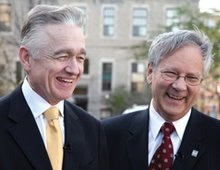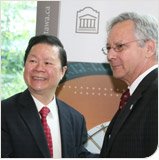
On June 25, 2008, Arbitrator Michel G. Picher released his 65-page ruling in the matter of the University of Ottawa vs. the Association of Professors of the University of Ottawa (APUO) regarding Professor Denis Rancourt’s discipline grievance related to the Fall 2005 offering of the course PHY 1703 “Physics and the Environment” (Physique et environnement), popularly known as the Activism Course.
.
The University had taken disciplinary action against Professor Rancourt charging that he had misrepresented his course in a detailed web posting, in such a way as to have described a dramatically different course not compatible with the official course description. The Arbitrator rejected the University’s charges, finding that the described course was within the purview of academic freedom.
.
.
The University had taken disciplinary action against Professor Rancourt charging that he had misrepresented his course in a detailed web posting, in such a way as to have described a dramatically different course not compatible with the official course description. The Arbitrator rejected the University’s charges, finding that the described course was within the purview of academic freedom.
.
The then dean of the Faculty of Science, chemistry professor Christian Detellier, had barged into the classroom on September 21, 2005, to suspend the course, causing a strong student reaction that was amply reported in the media. The University has since apologized for the Dean’s in-class intervention: LINK.
.
.
The public arbitration hearings were held in Ottawa on November 5, 8, 14, and 26, 2007. The Arbitrator refers to the Activism Course in his decision as having been made “something of a ‘cause célèbre’” (p.27 of the June 25th decision).
.
.
The ruling is a landmark award that strengthens and broadens the scope of academic freedom in Canada. The full text of the Award is available HERE.
.
.
The ruling establishes that pedagogical innovation and implementation are fully protected under the academic freedom enjoyed by a professor, including the choice of grading system – considered an integral part of the pedagogical method.
.
.
In the specific case, the protected pedagogical innovations included:
.
.
(a) A large fraction of the class time used to present societal and political material – in a physics course intended to deliver fundamental physics concepts as the only required physics course in an environmental studies program – as a way to motivate student learning and to position the science in the broad societal context. This was achieved using invited scientist and non-scientist speakers that included activists, politicians, community workers, etc. The ruling clarifies that no “exception [was] taken to the use of activism and social and political issues as catalysts to learning.”
.
.
(b) Parallel student workgroups with evolving themes and freely changing student memberships and town-hall-style whole-class discussions instead of traditional lectures delivered by the professor.
.
.
(c) An open invitation to all community members to freely and fully participate in the class, without necessarily officially registering and paying tuition, as a way to bring in the community to enrich class discussions and strengthen relevance and community connections. This brought in a variety of perspectives and expertises that would otherwise not have been available.
.
.
(d) Large latitude in individual student decision making regarding: order in which to learn things (e.g., workgroup membership and topic), depth of treatment, method of study, method of reporting progress, degree of cooperative work, etc. (Sharing was not considered cheating.)
.
.
(e) A satisfactory/non-satisfactory (S/NS) grading system rather than the traditional letter grade system (used in all other science courses given that term).
.
.
Having examined the long list of University complaints about how Professor Rancourt had, in his web communications (see ruling), subverted the “spirit, content, and function” (translated from French) of the course, the Arbitrator found that “that position cannot be sustained by the Arbitrator” and that all the innovations communicated and implemented by Professor Rancourt fell within his rights under academic freedom.
.
.
The ruling therefore again puts to rest the backward notions that hard sciences must be studied in isolation and that tunnel-vision specialization is the only acceptable way.
.
.
The Arbitrator added: “… the major change being with respect to the pedagogical innovation of independent group studies, the involvement of the students themselves in identifying areas of interest and the introduction of the satisfactory/not-satisfactory grading system. The Arbitrator is satisfied that those pedagogical initiatives were legitimately within the purview of the academic freedom enjoyed by Professor Rancourt …”
.
.
The ruling therefore also lays to rest the doctrinal view that only grades can motivate students in the hard sciences and that students must be “forced to learn”, least our technological society fall in ruin. LINK. (If that is true, then Canada’s new academic freedom is indeed a dangerous freedom.)
.
.
In addition, the Arbitrator’s award also affirms that (consistent with actual practice) a course can, through a process of pedagogical choices, be significantly different in its use of class time and in topics covered than a literal and restrictive reading of the official (Senate-approved) course description would suggest: How much class time a professor chooses to use on what is a matter of pedagogical freedom, in the professor’s attempt to achieve the best possible end results; keeping in mind a professor’s right to be political in the classroom, as already well established in Collective Agreements across the country and in past rulings.
.
.
In the words of the Arbitrator, “The assertion … to the effect that the publicized descriptions of the course contained a ‘radically different content’ as compared to what was contemplated in the official description of the course cannot be sustained by the Arbitrator” and “there is simply no equitable basis upon which the University, or Dean Detellier, could assert … that Professor Rancourt ‘…brought major changes to the content of his courses…’ (Arbitrator’s translation) … the evidence before this tribunal confirms that … [the changes] fell legitimately within the scope of his academic freedom in pursuing a different pedagogical approach …” (p.60-61 of the decision).
.
.
The Arbitrator’s ruling is in sharp contrast to Professor (on leave) Christian Detellier’s hearing statement that “‘squatting’ is not an appropriate means to implement curriculum change within a university” (p.19 of the decision).
.
.
Professor Rancourt won the decision on every major point. Even on the minor point of the course title, the ruling explicitly established that a professor can describe his course with a dramatically different title: “Activism Course: Understanding Power and its Contexts” (web call-out) versus “Physique et environnement” (official Senate-approved title).
.
.
If your conclusion is “In the classroom, the students and professor rule!”, then you get an S for satisfactory, and you deserve an A+. Let’s make our education…
.
.
Epilogue: Legal Counsel for the University, Michelle Flaherty, apparently quit or was fired some months after the hearings, leaving her voice-mail greeting on the University phone for a week or so after she left; and without any official announcement of thanks or recognition or acknowledgement of departure from the University, leaving the position vacant to this day. Legal defence for the APUO was assumed by labour lawyer Sean T. McGee of Nelligan O'Brien Payne, who built the case around the principle of academic freedom. Christian Detellier went on academic leave for two years in 2006 before going back to being a regular professor in the Department of Chemistry. The Faculty of Science is on its fourth dean or interim-dean since 2005 (one died of cancer). Dean André E. Lalonde is presently the University’s defender of academic freedom in that faculty and is actively pursuing Professor Rancourt for alleged departures from the official course description in SCI 1101, Science in Society, Fall 2006, and for the professor’s teaching methods and grading practices in PHY 4385 and PHY 5100, Solid State Physics, Winter 2008.
.
LINKS



